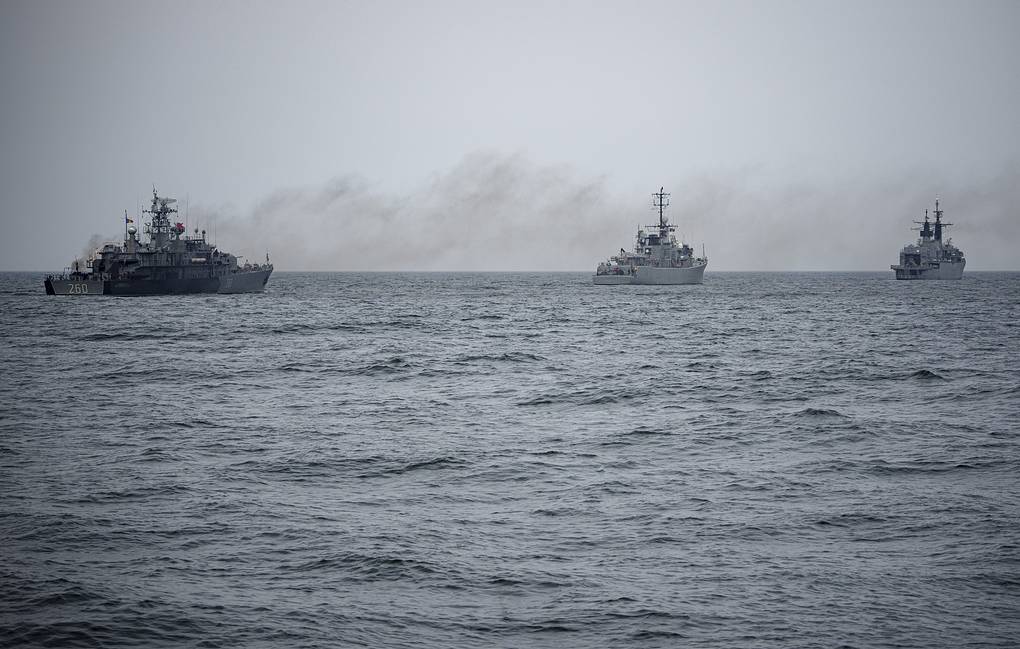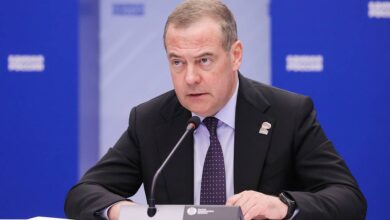Press review: US eyes Ukraine peace by 2029 as Russia warns of Black Sea buildup
Top stories from the Russian press on Monday, July 28th
MOSCOW, July 28. /TASS/. Trump’s administration would view resolving the Ukraine conflict by 2029 as a success; Russia has cautioned that NATO and EU military build-up in the Black Sea is raising the risk of confrontation; and US President Trump is seeking to broker peace between Thailand and Cambodia. These stories topped Monday’s newspaper headlines across Russia.
Vedomosti: Washington views Ukraine conflict resolution by 2029 as success
If a resolution to the Ukraine conflict is achieved by the end of US President Donald Trump’s second term in January 2029, it would be considered a success, Trump’s Special Envoy for the Middle East Steve Witkoff said. He also stressed that ending the conflict in Gaza by the same deadline remains a priority. Experts interviewed by Vedomosti believe the Trump administration is unlikely to adopt a significantly tougher approach toward Russia, will shift financial responsibility for Ukraine to Europe, and may prioritize diplomatic moves such as a trilateral summit over substantive pressure.
US Secretary of State Marco Rubio addressed the same issue in his July 27 interview with Fox News. He emphasized Washington’s commitment to achieving a settlement in Ukraine but warned that Trump is "losing patience." Meanwhile, Russian presidential spokesman Dmitry Peskov told reporters on July 27 that Russia must continue pursuing the goals it set at the start of the special military operation.
According to Dmitry Suslov, Deputy Director of the Center for Comprehensive European and International Studies at the Higher School of Economics, the Trump administration is becoming increasingly aware of the conflict’s complexity and is gradually stepping back from demands for an immediate ceasefire. Suslov believes Washington will shift the financial load of supporting Kiev onto European allies.
The expert does not rule out the possibility of symbolic penalties against Russia following the expiration of Trump’s 50-day ultimatum but considers a substantial escalation in US policy toward Moscow unlikely. As for Witkoff himself, Suslov told Vedomosti that his influence has declined recently due to the growing prominence of Rubio and Witkoff’s failure to deliver results on key issues.
Pavel Koshkin, Senior Research Fellow at the Institute for US and Canada Studies, agrees that Trump’s personal approach to the Russia-Ukraine conflict is unlikely to undergo a major change. In his view, Washington may attempt to organize a trilateral meeting between Trump, Russian President Vladimir Putin, and Vladimir Zelensky to speed up the negotiation process. "US support for Ukraine through European partners will continue, but Trump is unlikely to endorse a genuinely tougher stance on Russia," Koshkin told Vedomosti. He added that, for this reason, Witkoff may gradually shift focus toward the Russian track, as Trump sees him as a counterbalance to America’s foreign policy hawks.
Izvestia: Russia warns of rising Black Sea militarization amid NATO, EU geopolitical drive
NATO has significantly expanded its intelligence-gathering activities in the Black Sea, Russian Foreign Ministry’s Director of the Department of European Cooperation Vladislav Maslennikov told Izvestia. He said the alliance is actively upgrading its military infrastructure in Bulgaria and Romania. The European Union is also showing alarming levels of activity, having recently adopted a new strategy for the region. Its goal, Maslennikov said, is to turn the Black Sea into a theater of direct confrontation with Russia. Experts emphasized that militarization in the area threatens maritime navigation and international trade, while also increasing the risk of a direct military clash between Russia and the West.
"NATO’s military presence in the Black Sea region is expanding, and it is, of course, being justified by the so-called ‘Russian threat.’ NATO claims the Black Sea falls within its area of responsibility. The alliance has significantly stepped up its reconnaissance and surveillance efforts in the Black Sea and plans to expand satellite monitoring of the area," Maslennikov told the newspaper.
Security concerns stem not only from NATO but also from the European Union. In late May, the European Commission unveiled a new EU strategy for the Black Sea region. It outlined plans to enhance the EU’s geopolitical role as a reliable player in the Black Sea region, among other goals.
"This strategy explicitly states that it is based on a geopolitical project aimed at ensuring the region’s security and democratic consolidation along Western values. The coastal states in this context serve merely as a platform for the EU’s political ambitions to effectively push Russia out of the region, despite the fact that we are one of the key Black Sea powers," Maslennikov noted.
As militarization intensifies in the Black Sea, the risk of military incidents involving Russia and NATO countries grows, analyst at the Center for Mediterranean Studies at the Higher School of Economics Tigran Meloyan told the newspaper. However, he stressed that a deliberate, direct attack by any side remains improbable.
To reduce the danger of a direct military clash, a political dialogue between the parties is essential, political analyst Dmitry Sidorov told Izvestia.
"Russia-NATO political dialogue was completely severed several years ago, and under the current circumstances, its revival appears unrealistic. Russia continues to engage with individual NATO and EU member states, which is important, but not enough to establish new rules of engagement that would satisfy all parties. It is critically important to maintain dialogue with Turkey, including on the issue of compliance with the Montreux Convention," the expert said.
Vedomosti: Trump aims to mediate Thailand-Cambodia peace using trade pressure
US President Donald Trump has launched an effort to resolve another military conflict that erupted in 2025, this time in Southeast Asia, between Thailand and Cambodia. On July 26, he held consecutive phone conversations with Thailand’s acting Prime Minister Phumtham Wechayachai and Cambodian Prime Minister Hun Manet. Following these discussions, Trump announced that both parties are committed to an immediate ceasefire and peace. Analysts interviewed by Vedomosti believe that Thailand and Cambodia lack the military capacity for sustained conflict and are economically dependent on tourism, making them more likely to respond to external mediation, particularly Trump’s trade leverage and Malaysia’s diplomatic experience.
The two sides have not yet officially abandoned their territorial claims, though they likely lack the capacity to continue the conflict for much longer, said Ekaterina Koldunova, Director of the ASEAN Centre at MGIMO University. In her view, both nations are heavily reliant on tourism, and the primary concern raised by media outlets has been the conflict’s potential impact on the tourist industry.
Another potential underlying cause of the clash, she told Vedomosti, may be a "redistribution of control over critical border drug trafficking routes in Southeast Asia."
From a military standpoint, Koldunova emphasized that neither Cambodia nor Thailand is a regional heavyweight, and neither is likely capable of sustaining prolonged hostilities. For this reason alone, both sides are in urgent need of negotiations simply to reassess.
The notion that Trump may have had a role in fueling the conflict with the aim of later resolving it to earn accolades, such as a Nobel Peace Prize, is not substantiated, Alexander Korolev, Deputy Director of the Centre for Comprehensive European and International Studies at the Higher School of Economics, told the newspaper. He believes that Southeast Asia and ASEAN affairs are not among Trump’s core priorities, unlike Ukraine and Israel. Trump’s mediation approach in the Thailand-Cambodia conflict, Korolev added, mirrors his tactics in the Ukraine crisis — namely, intimidation and ultimatums. While such strategies have proven ineffective with Russia, they may hold influence with Phnom Penh and Bangkok due to the significance of trade incentives.
Korolev noted that hostilities noticeably subsided following Trump’s calls. He also recalled that Malaysia has a positive track record in mediation. Ultimately, the combined efforts of Malaysia and Trump’s ultimatum could very well lead to a pause in the conflict.
Kommersant: Belgrade signals willingness to sanction Russia in return for EU accession
A statement by Serbia’s Minister for European Integration Nemanja Starovic, expressing Belgrade’s willingness to impose sanctions on Russia in exchange for European Union membership, has sparked a political scandal, Kommersant writes. In Serbia, the remarks were sharply criticized by the pro-government Movement of Socialists, led by former Deputy Prime Minister Aleksandar Vulin, while Prime Minister Duro Macut was quick to assure the public that no anti-Russian sanctions would be enforced under his administration.
Nevertheless, Serbian President Aleksandar Vucic himself has repeatedly acknowledged the possibility of sanctions. Sources familiar with the Serbian leadership’s stance told Kommersant that such statements may serve as "a kind of trial balloon to test public reaction" and are likely aimed at the segment of the population that strongly supports EU accession.
Many interpreted Starovic’s remarks as a direct message to Brussels: if the EU wants Serbia to impose sanctions on Russia, then it should speed up Serbia’s accession process. The comments also drew a response from Moscow. First Deputy Chairman of the State Duma Committee on International Affairs Alexey Chepa dismissed the position as "bargaining" with the European Union.
Sources familiar with the Serbian government’s stance told Kommersant that these recent remarks may be part of an effort to gauge public sentiment. Furthermore, they serve as a signal to the pro-EU integration bloc in Serbia.
Sources indicate that Serbia’s leadership is signaling a readiness to adopt anti-Russian measures, while also acknowledging that taking such a step at this time would be imprudent. Over the past three years, Belgrade’s accession talks with Brussels have largely stalled, while Montenegro and Albania have emerged as the leading candidates for EU membership.
Nezavisimaya Gazeta: Weaker dollar offers mixed outcome for exporters, creates hurdles for Russia
US President Donald Trump has outlined the advantages of a weaker dollar — in his view, a weaker dollar benefits American manufacturers. In contrast, experts interviewed by Nezavisimaya Gazeta believe that a weakening dollar against the ruble leads to budgetary losses for Russia. They expect that by the end of the year, the Russian currency will be gradually weakened to 90 rubles per dollar. Experts argue that the weakening of the dollar has become an indicator of investor concerns over the trade policies pursued by the US president.
Back in the spring, the head of the White House began threatening countries with higher tariffs, and later, negotiations over new tariff rates were postponed until August. This had little impact on the dollar’s dynamics, which investors interpreted as a sign of indifference on the part of the US administration to the currency’s decline. As analysts explained, the imposition of tariffs on imports from countries that have not signed new trade agreements with the United States triggered a significant capital outflow from the dollar.
The weakening of the dollar is not beneficial for the Russian ruble, experts believe. A notable decline in the dollar typically drives up commodity prices, which could theoretically lead to ruble appreciation, economist Dmitry Golubovsky told Nezavisimaya Gazeta. Countries with high levels of foreign currency debt may benefit from a weaker dollar, as it makes debt servicing more affordable. However, for commodity exporters such as Russia, the effect is more nuanced, Freedom Finance analyst Vladimir Chernov explained.
"Prices for oil, metals, and other resources are traditionally denominated in US dollars. If the dollar depreciates in global markets, then commodity prices may rise in dollar terms, which could theoretically compensate for the dollar’s diminished purchasing power. However, the situation is different in ruble terms: for Russia, a weaker dollar, all else being equal, leads to lower ruble-denominated export revenues. This, in turn, hits the federal budget, tax revenue, and export-oriented companies," Chernov explained. If strong demand for commodities and high oil prices were to persist alongside a weak dollar, it could be beneficial for Russia, but such a combination is rare, he added.

